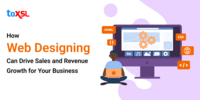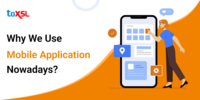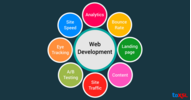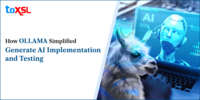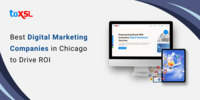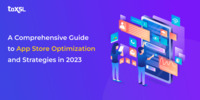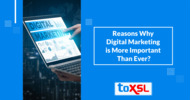- Feb 03, 2026
- Digital Marketing
- 3782
Share this post on:
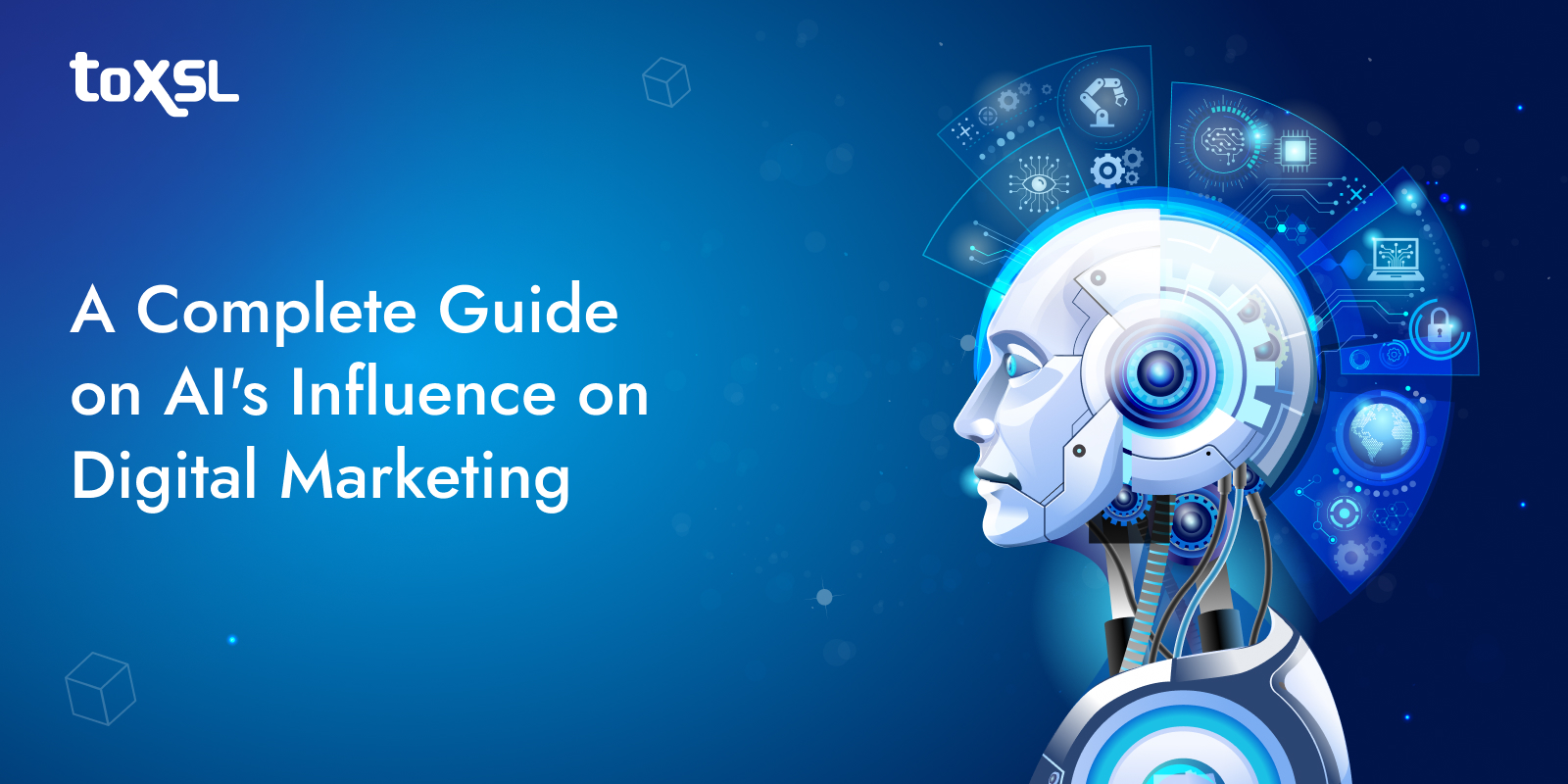
Artificial Intelligence is dominating all industry verticals and has become the most impactful innovation of all time. A report published by Statista says that the market for Artificial Intelligence in marketing can reach to $15.84 billion. The source also claims that by 2028, AI in marketing will reach $107.5 billion.
Nowadays, whenever we hear about Artificial Intelligence, we think of chatbots, self-driving cars, human robots, and more. It has become crucial for all businesses to leverage the power of Artificial Intelligence to keep up with the competitive market. In this article, we will talk about how AI will transform the digital marketing industry in 2026.
Key Takeaways
AI is transforming digital marketing through automation, personalization, and predictive insights.
Personalization at scale is one of AI’s biggest advantages.
AI improves content creation, advertising performance, and customer engagement.
Chatbots and predictive analytics enhance customer experience and conversions.
Ethical use and data privacy are critical for long-term success.
AI in Marketing
AI (Artificial Intelligence) has become increasingly important in marketing. It is an innovative approach that helps businesses advance by offering them unique ways to reach their target audiences.
Moreover, AI uses marketing tools to analyze vast amounts of data, understand patterns, and predict future trends accurately. AI allows for personalized messaging, automation, data analysis, predictive analytics, customer segmentation, and more.
Types of AI in Marketing
The marketing field is evolving due to technological advancements such as artificial intelligence (AI). AI technology enables marketers to engage consumers through personalization, automation, and predictive insights. Let us explore the four types of AI in marketing:
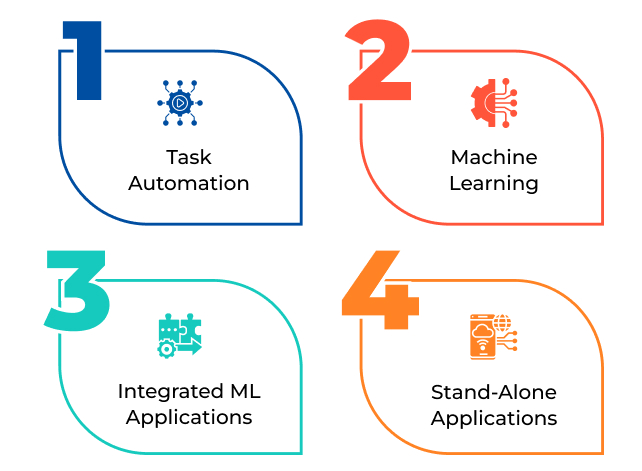
Task Automation: Task automation focuses on automating repeating and structured tasks. The software tools used to automate tasks focus on simplifying the manual steps involved in marketing operations. These tasks are often implemented via bots, scripts, or rules-based logic, reducing delays and improving team performance. Here is a list of common examples of task automation tools available to help marketers in their day-to-day duties:
- Email automation software: Services like Mailchimp, Venturz, Constant Contact, Drip, GetResponse, SendInBlue, etc., allow marketers to set up personalized email campaigns, monitor engagement levels, measure success rates, conduct A/B testing, and optimize delivery strategies using machine learning algorithms. Using an email verifier, such as Clearout, helps ensure that your mailing list contains valid addresses, reducing bounce rates and improving overall campaign effectiveness. Additionally, implementing psd to email conversion enables marketers to transform creative designs into responsive, professional email layouts that maintain visual integrity and consistency across all devices and platforms.
- Social media management systems: Platforms such as Hootsuite, Sprout Social, Buffer, etc., enable marketers to schedule, publish, and analyze activity across multiple channels. This channel includes Twitter, Facebook, LinkedIn, Instagram, and Pinterest. These tools offer bulk upload capabilities, collaboration features, influencer tracking, sentiment analysis, and post-recycling to maximize reach while saving time and effort.
- Content curation and amplification software: Applications like Curio, Revue, and Scoop.it, Nugget, etc., support content discovery, organization, sharing, and promotion for blogs and articles. Artificial intelligence helps identify new topics, find high-quality resources, and track engagement patterns.
- Search engine optimization tools: SEO solutions like Ahrefs, SEMrush, DeepCrawl, Botify, and OnCrawl leverage AI to analyze website structure, keyword density, link profiles, backlink quality, competitor insights, page load speeds, mobile friendliness, meta descriptions, title tags.
Machine Learning: Machine learning (ML) algorithms collect the data and help companies with decision-making. They can decode texts, recognize images, and generate responses. ML helps businesses grow by offering them a personalized marketing experience.
- Supervised Learning: It is one of the most common forms of ML used in marketing AI applications. Supervised learning involves teaching computers to make predictions or perform specific tasks by providing labeled datasets. Popular algorithms under supervised learning are Logistic Regression, Support Vector Machines (SVM), Random Forests, Gradient Boosting, Decision Trees, Neural Networks, and others. They are used in recommendation systems, lead scoring, fraud detection, chatbots, and content creation.
- Unsupervised Learning: This technique helps businesses discover hidden patterns and structures in unstructured data. The best example of this type is Clustering and Dimensionality Reduction. These help businesses in customer segmentation, anomaly detection, social network analysis, and sentiment analysis.
- Semi-Supervised Learning: As the name suggests, semi-supervised learning combines supervised and unsupervised learning. It improves performance when only limited amounts of labeled data are available. The best examples of this type are Graphical Lasso, Pseudo-Labeling, Transformer-based architectures, etc.
Integrated ML Applications: Integrated machine learning (ML) applications in AI refer to the use of tools that use statistical modeling techniques to identify patterns in large datasets. These apps do not require inputs daily and combine the knowledge of statistics, programming languages, and cloud infrastructure. Such integrations allow organizations to gain deep insights into complex problems in business operations, helping generate revenue.
Some practical examples include generating product recommendations, personalizing email messaging, optimizing site architecture for easy navigation, and detecting unusual patterns.
Stand-alone Applications: Stand-alone machine learning (ML) applications refer to software programs designed specifically around a single algorithm or methodology. These tools focus on performing one task well and involve pattern recognition or statistical inference from structured, semi-structured, or unstructured data. In marketing, these algorithms analyze existing customer profiles and understand their buying habits to determine ideal targeting parameters for new advertising campaigns. They ensure ads reach only those people most likely to show interest, minimizing wasted impressions and expenses.
Benefits of AI in Digital Marketing
Artificial Intelligence (AI) has revolutionized digital marketing. AI offers unparalleled opportunities for marketers to analyze data, gain a deep understanding of customer behaviors, and develop highly customized solutions across all stages of marketing. Here are six specific benefits of AI in digital marketing.
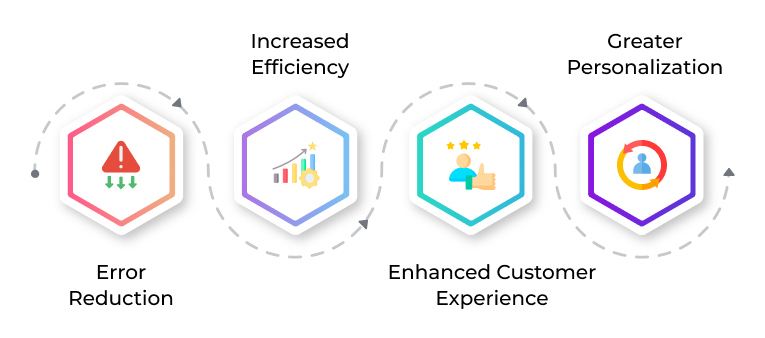
Error Reduction: Adopting artificial intelligence (AI) in digital marketing activities helps minimize errors due to the following capabilities:
- Automation of repetitive tasks: AI automates repetitive processes like data entry, email responses, social media updates, and reporting. This reduction in human effort minimizes the possibility of errors associated with inconsistent work habits.
- Superior accuracy in data analysis: AI-powered tools process massive amounts of data with great accuracy while identifying accuracy in patterns. Accurate insight helps businesses make better and well-informed decisions.
- Reduced miscommunication: AI applications communicate clearly through predefined messages or instructions. Moreover, AI messaging decreases confusion and ensures everyone interprets instructions correctly.
Increased Efficiency: The incorporation of artificial intelligence (AI) in digital marketing functions significantly enhances operational efficiency in various ways. AI can manage repetitive and time-consuming jobs such as data entry, content moderation, report creation, and scheduling posts. Businesses get more time for high-level planning and strategy development.
AI algorithms generate valuable insights by analyzing structured or unstructured data sets. These actionable insights allow marketers to make informed choices on audience segments, advertisement placements, and general messaging approaches. Moreover, using this knowledge, marketers can design highly relevant content experiences that resonate deeply with individuals, optimizing message penetration rates.
Furthermore, AI assistance is available to deal with client questions, issues, and requests 24/7. It means monitoring faster response times and boosting client satisfaction, retention, and long-term loyalty.
Greater Personalization: One main advantage of AI in marketing is its ability to personalize customer interactions at scale. AI algorithms allow companies to collect large amounts of data from multiple channels to create detailed profiles and tailor recommendations. Ultimately, personalization leads to higher conversion rates, increased loyalty, and ROI for digital marketers. Learn these AI-powered marketing skills with Skillfloor’s Digital Marketing Course in Bangalore, featuring hands-on training, internships, certification, and 100% placement support.
- Behavioral Tracking and Segmentation: AI technologies track user behavior across devices, sessions, and channels, enabling marketers to create segments based on interests and demographics. It helps businesses create personalized messages and experiences that resonate with their audience.
Moreover, AI empowers marketers to generate unique creative elements, including images and videos that are designed specifically for each consumer. - Adaptive Targeting: Blending machine learning algorithms into targeting practices helps businesses reach their potential audience. Moreover, as consumers navigate new sections of websites and browse categories or search terms differently, AI optimizes targeting strategies accordingly, maximizing relevancy.
Enhanced Customer Experience: AI technology has a significant impact on improving the customer experience in digital marketing. AI uses machine learning algorithms and big data analysis to gather information about users’ preferences, browsing history, and other factors to suggest highly relevant products. With AI, businesses can quickly identify potential problems and address the issues.
A few ways in which AI technology is changing the future of digital marketing
Artificial Intelligence (AI) has transformed various industries in recent years, and digital marketing is no exception. The integration of Artificial Intelligence (AI) technology in digital marketing has significantly transformed many aspects of the industry. Below are a few ways in which AI is changing digital marketing.

AI-driven Chatbots: AI-powered chatbots are transforming the future of digital marketing in numerous ways. Here is how chatbots have changed and will continue to change the industry:
- Chatbots offer round-the-clock availability and can engage with customers 24/7, answering queries at all hours of the day or night. It increases customer satisfaction, reduces response times, and helps build trust and loyalty.
- They can handle countless conversations without losing effectiveness, making it easier for businesses to reach large numbers of customers.
- Chatbots can analyze customer data, behavior, and preferences to personalize responses, creating a bond with users.
- Businesses can minimize labor expenses associated with hiring extra candidates to manage social media or emails using chatbots.
Predictive Analysis: Predictive analytics offers opportunities for businesses to optimize campaigns, drive more revenue, and better understand consumer behaviors. Here are some key points on how predictive analytics is revolutionizing the field of digital marketing:
- Personalizing content and messaging: Marketers can gain insight into consumer preferences and behaviors using predictive analytics. This help businesses tailor messaging and advertising strategies accordingly. This results in improved relevancy and resonates better with target audiences.
- Optimizing Ad Spending: Predictive analytics allows advertisers to allocate ad budgets and ensure maximum ROI by analyzing vast amounts of consumer data and market trends.
- Automating Data Analysis: Machine Learning algorithms integrated with predictive analytics programs streamline the process of collecting and evaluating consumer insights.
AI-Generated Content: Artificial Intelligence (AI) generated content has rapidly transformed the way we create, consume, and share information. AI-generated content significantly speeds up production, allowing marketers to produce high-quality content quickly and cost-effectively.
Moreover, AI content creation tools generate highly personalized experiences based on factors like search history, geographic location, browsing behavior, etc. Furthermore, AI content creation platforms allow multiple parties to contribute and edit content simultaneously, ensuring faster completion of work.
Voice Search: The rise of voice assistants such as Siri, Google Assistant, Alexa, and Cortana is impacting the future of digital marketing. As more users adopt voice technology in their daily lives, marketers must adapt to this growing shift in search behavior, as most users are opting for these voice assistants for searching.
Fraud Detection: Fraud detection is becoming a critical aspect of the digital marketing industry as advertising fraud is growing. Effective fraud detection help publishers, media buyers, ad networks, and brands maintain long-term partnerships that sustain the ecosystem. Moreover, by preventing bots and other fraudulent sources, fraud detection solutions ensure budget allocation is focused on reaching legitimate targets and increasing sales.
Conclusion
Artificial Intelligence has changed digital marketing, making it more efficient, measurable, and accessible than ever before. It helps in web search optimization, online advertising, content management and generation, customer relationship management, sentiment analysis, and language translation.
The integration of AI technology enables businesses to gather large amounts of information about their customers and the marketplace. It helps analyze the data quickly, make better-informed decisions, and automate certain processes.
It also opens new possibilities that were previously difficult or impossible to achieve. These changes ultimately help businesses make better decisions faster, increase efficiency, reduce costs, and improve competitiveness. Overall, AI continues to play an increasingly important role in modern digital marketing, and we can expect further advancements in the coming years.
Frequency Asked Questions
1. How is AI changing digital marketing?
AI helps businesses understand customer behavior, predict trends, and automate tasks like email marketing and ad targeting. It makes marketing faster and smarter. At ToXSL Technologies, we use AI tools to create data-driven strategies that improve results and deliver personalized customer experiences.
2. What are some common uses of AI in digital marketing?
AI is used for chatbots, personalized ads, content recommendations, and analyzing customer data. It helps brands connect better with users. At ToXSL Technologies, we use AI to improve engagement, track performance, and ensure your digital marketing campaigns reach the right people at the right time.
3. Can AI improve customer experience in marketing?
Yes, AI helps create more personal and timely interactions. It understands customer preferences and delivers content they are likely to enjoy. At ToXSL Technologies, we use AI-powered tools to boost user engagement, satisfaction, and loyalty by giving customers exactly what they need, when they need it.
4. Is AI cost-effective for digital marketing?
Absolutely. AI reduces manual work, improves targeting, and increases campaign success, which saves money in the long run. At ToXSL Technologies, we help businesses use AI to optimize marketing budgets and get better returns on investment by making smart, automated decisions.



